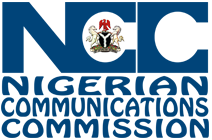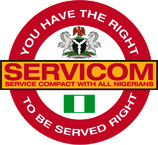 |
NIGERIAN COMMUNICATIONS COMMISSION
|
 |
INTRODUCTION
The Compliance Monitoring and Enforcement Department is structured into two (2) units reporting to the Director Compliance Monitoring and Enforcement (DCME) assisted by staff in the DCME’s office. Our primary responsibility is to monitor and enforce compliance with set rules and regulations as defined within the Nigerian Communications Act 2003 and subsidiary regulations in order to ensure smooth conduct within the industry.
The two units of the department are:
- Compliance Monitoring Unit (CM) headed by the HCM
- Monitors and ensures Licensees’ compliance with the Commission’s Laws mainly the regulations, guidelines, directions, and license conditions.
- Where cases of breaches or non-compliance with the Laws are identified, the cases are forwarded for further enforcement action.
- Enforcement Unit (E) headed by the HE
- Enforce compliance with NCA, 2003, License Terms & Conditions, Regulations, Guidelines & Directions
- Detection of violators;
- Physical & Other Forms of Enforcement Actions including Imposition of fines, Investigation, Prosecution etc.
LOCATION
Fourth (4th) Floor,
Nigerian Communication Commission Head Office Annex,
Communication and Digital Economy Complex,
Mbora, Abuja.
HEAD OF DEPARTMENT
Mr. Efosa Idehen
Tel: 09-4617356, 09-4617000
Email: ,
MISSION STATEMENT
To support organisational objectives through fair and firm Compliance Monitoring and Enforcement of rules and regulations in the communications industry.
VISION STATEMENT
To be an inspirational and responsive reference point in Compliance Monitoring and Enforcement in the Communications Industry.
DETAILS OF STAKEHOLDERS (INTERNAL /EXTERNAL)
- Licensees
- Federal Ministry of Communications and Digital Economy
- National Assembly
- Nigerian Immigration Service (NIS)
- Nigerian Customs Service (NCS)
- Standards Organisation of Nigeria (SON)
- Courts
- Police
- Importers of telecoms equipment
- Telecom Equipment manufacturers
- Consumer Affairs
- Policy, Competition & Economic Analysis
- Legal & Regulatory Affairs
- Finance Services
- Spectrum Administration
- Technical Standards & Network Integrity
- Telecom Service Providers
SERVICE PROVISION BY CMED (INTERNAL/ EXTERNAL)
- Monitor and Enforce compliance to all matters relating to the performance of all licensees.
- Carry out Surveillance within all regions of the country aimed at :
- Identifying and reducing the activities of illegal operators
- Educating them on procedures for regularizing their operations in line with the provisions of section 31 of the NCC Act
- Creating awareness about the Commission and its activities and gathering relevant industry statistics.
- Propose relevant sanctions to be enforced on erring operators and licensees in accordance with the Nigerian Communications (Enforcement Process) Regulations 2019 in liaison with Legal and Regulatory Department.
- Liaise with relevant external stakeholders e.g. security agencies, judiciary etc. in executing our enforcement functions;
- Coordinate the Commission’s relationship with other government agencies like NESREA/State governments etc. and provide regulatory intervention for the operators.
- Participate in development, review and drafting of Regulations, Guidelines, Directions and Telecommunications Laws etc.
- Coordinate compliance monitoring/enforcement activities with other departments who are involved with monitoring compliance or enforcement with licensees' obligations.
- CMED handles internal and external correspondences
SERVICE DELIVERY
In discharging the above services the CME department promptly attends to stakeholders i.e. licensees, internal and external in a prompt, professional and excellent manner in consonance with the Commission’s core values.
MONITORING AND PUBLISHING
The Department by Section 89 of the Act mandates the Commission to monitor all significant matters relating to the performance of all licensees and publish annual reports thereon at the end of each financial year.
The timeframe for acknowledgement of complaints is normally within 48 hours of receipt of that complaint. However, the timeframe for resolution of complaints is dependent upon the nature of the complaint as different complaints have varying processes for resolution.
GRIEVANCE REDRESS MECHANISM
Stakeholders are enjoined to seek redress by calling or preferably writing to the Desk Officer whose details are listed below;
Stephanie Oronsaye,
Fourth (4th) Floor,
Nigerian Communication Commission Head Office Annex,
Communication and Digital Economy Complex,
Mbora, Abuja.
Tel: 09-4617000
Email:
STAKEHOLDERS OBLIGATION/EXPECTATION
To help the department discharge its duties, stakeholders (internal and external) are expected to:
- Be fully informed of the department’s Servicom Charter.
- Follow the laid down procedures/channels for obtaining required services and information.
- Request/apply in good time to ensure necessary processing.
- Coverage and roll out obligations: Coverage and network roll out obligations for the licensee with maps and detailed information on the network roll out targets;
- Frequency Spectrum and interference monitoring and resolutions: The assignment of the frequency spectrum should be clearly set out in the spectrum licence and should be properly cross-referenced in the telecommunications service licence.
- Right of way and environmental issues: Compliance with applicable legislation, especially the environmental legislations and laws to ensure public safety.
- Quality of Service: Quality of service thresh hold and the monitoring intervals;
- Type Approval: Any rule on type approval of equipment should be set out in the licence;
- Numbering and Number Portability: The allocation of numbers and obligations for the number portability;
- Tariff Approvals: All tariffs must be approved by the Commission and licensees can only provide services at the tariff rates and charges so approved by the Commission and shall not depart there from without prior written approval by the Commission;
- Interconnection Issues: Interconnection agreements must be filed with the Commission as appropriate.
- Information: Timely submission of information to the Commission and the frequency of such reports;
- Customer Protection:
- The prior approval by the Commission of the standard subscriber contract;
- The provision of detailed and accurate billing;
- The provision of procedure for the settlement of disputes;
- Publication and adequate notice of any change in the access conditions, including tariffs, quality and availability of services;
- Provision of customer code of practice;
- Establishment of Customer Care Centers (CCC) , Customer Care help lines (CCHL)
CONCLUSION
The department is poised to work with its stakeholders towards the growth and development of the Nigerian Telecom sector and providing consumer satisfaction.